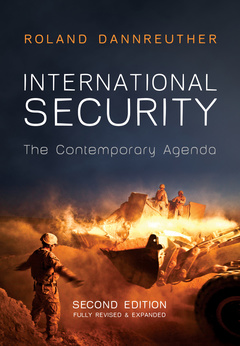Description
International Security (2nd Ed.)
The Contemporary Agenda
Author: Dannreuther Roland
Language: English
Subject for International Security:
Keywords
agenda; framework; analytical; introduction; new; challenge; part; list; water; environmental; struggle; migration; people; oil; move; resources; references; proliferation; cyber; conclusion; destruction; future; mass; weapons; challenges; spaces
Publication date: 04-2013
340 p. · 16.9x24.9 cm · Hardback
Publication date: 05-2013
340 p. · 16.8x24.1 cm · Paperback
Description
/li>Contents
/li>Readership
/li>Biography
/li>
The book is organized into four main parts. Part 1 provides an analytical framework for the book, identifying the most significant post-Cold War shifts in international security and recent theoretical developments in security studies. Part 2 analyses the root causes for contemporary warfare, the dilemmas and debates over military intervention, and the role played by the UN, NATO and other organizations in maintaining international peace and security. Part 3 assesses the challenges of environmental security, including the threat of resource-based conflict, most notably over oil and water, and the perceived security challenges of international migration. Part 4 discusses the new security challenges posed by international terrorism, the proliferation of weapons of mass destruction, and cyber warfare. It explores the strategies and policies adopted by the United States, particularly in the aftermath of 9/11 and assesses the implications of the rise of China and other emerging powers.
This book will be essential reading for students and analysts of international relations, international security and strategic studies.
Acknowledgements
Introduction: The Challenge of the New Security Agenda
Part I Analytical Framework
1 Thinking about Security after the Cold War
2 Theorizing about Security after the Cold War
Part II The 'New Wars' and Intervention
3 Understanding Contemporary War and Insecurity
4 Dilemmas and Challenges of Intervention
5 Collective Security, Alliances and Security Cooperation
Part III Environment, Resources and Migration
6 Environmental Security
7 The Struggle for Resources: Oil and Water
8 People on the Move: Migration as a Security Issue
Part IV Asymmetric Power and Asymmetric Threats
9 International Terrorism and the Impact of 9/11
10 Proliferation of Weapons of Mass Destruction
11 Cyber Warfare and New Spaces of Security
Conclusion: The Challenges for the Future
References
Index
These books may interest you

Contemporary European Security 160.25 €

Contemporary European Security 46.39 €


